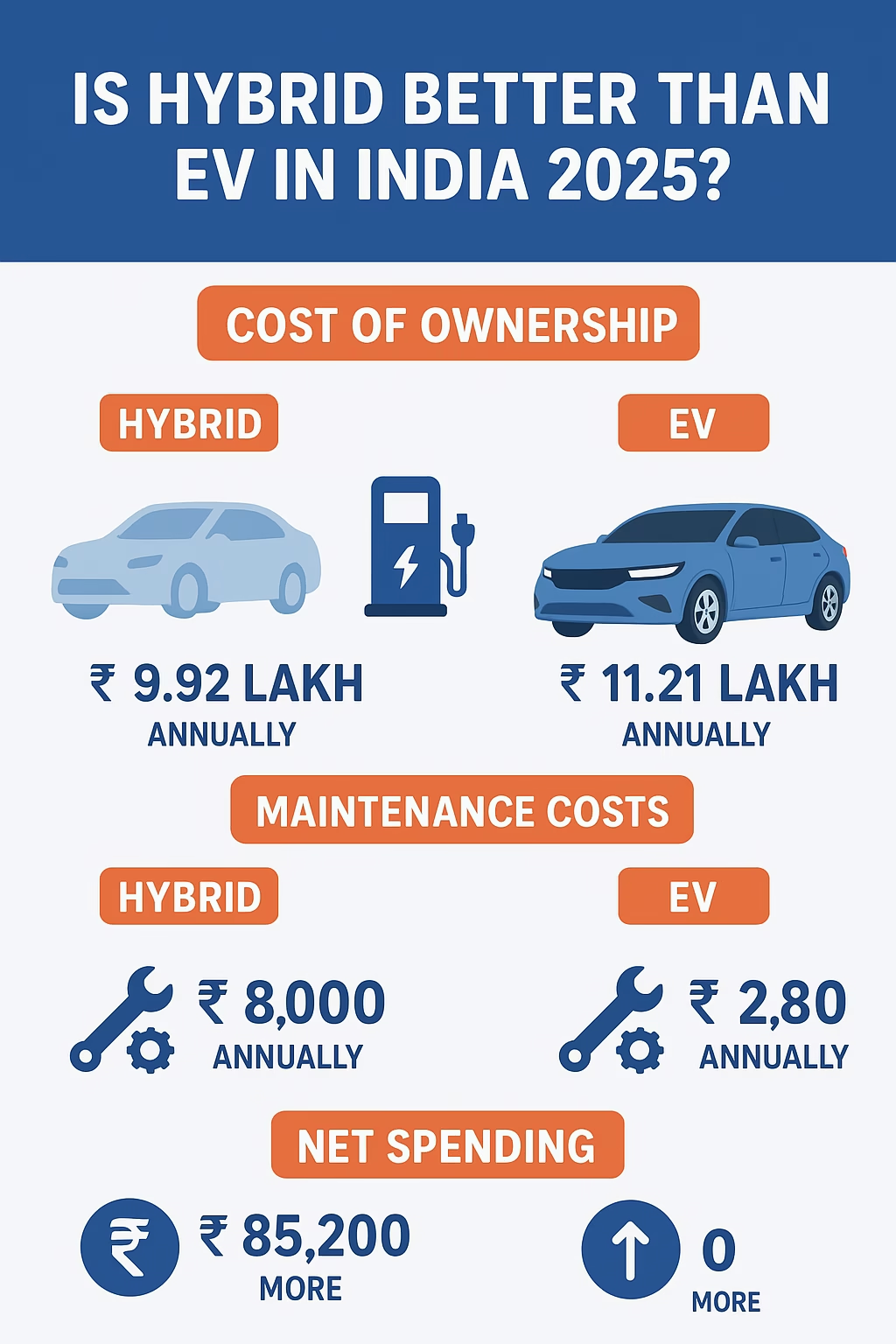🚗 Introduction: The Big Question for 2025 Car Buyers
In 2025, every Indian buyer stepping into a car showroom faces the same confusion—Hybrid vs EV in India 2025: which one makes more sense? EVs are everywhere in advertisements, and government subsidies make them sound futuristic and eco-friendly. On the other hand, hybrid cars are quietly winning the trust of middle-class families with their balance of petrol and electric efficiency.

If you’ve been wondering whether to go for an electric vehicle or stick with a hybrid in 2025, this detailed cost and ownership analysis will clear the air. Let’s break it down step by step.
💰 Hybrid vs EV in India 2025: Purchase Cost
One of the first things Indian buyers check is the on-road price.
- EVs: Entry-level EVs like the Tata Tiago EV start around ₹8.5 lakh, while premium EVs like the Hyundai Ioniq 5 or BYD Seal easily cross ₹40–60 lakh. Even popular choices like the Tata Nexon EV cost around ₹15–18 lakh.
- Hybrids: Toyota Hyryder and Maruti Grand Vitara Hybrids start from ₹15–17 lakh, which overlaps with the EV range but doesn’t go too high.
👉 Verdict: If you’re budget-sensitive and want long-term fuel savings, hybrids are safer, while EVs look attractive if you get state subsidies and have access to charging infrastructure.
⚡ Running Costs: Electricity vs Petrol
This is where the hybrid vs EV in India 2025 debate gets interesting.
- EVs: Charging at home costs around ₹1–1.5 per km. Fast charging stations, however, are charging more in 2025—sometimes ₹3–4 per km.
- Hybrids: With 20–28 kmpl mileage in city conditions, hybrids cost around ₹4–5 per km considering petrol prices hovering near ₹100/liter.
👉 Infographic-worthy fact: Over 5 years of daily driving (10,000 km/year), an EV can save up to ₹2–3 lakh compared to a hybrid.
🔧 Maintenance Costs: Who Wins in the Long Run?
- EVs: Have fewer moving parts, no oil changes, and no clutch replacements. The battery warranty covers 6–8 years. Maintenance bills are usually 30–40% cheaper than petrol cars.
- Hybrids: Still need regular servicing, oil changes, and petrol engine care. Battery replacement (if needed) costs around ₹1–2 lakh after 7–8 years.
👉 Winner: EVs are cheaper to maintain if you plan to keep the car long-term.
💸 Resale Value in 2025
A major concern for Indian buyers is resale value.
- EVs: Still face uncertainty. Buyers are worried about battery life degradation after 5–7 years. Resale is improving, but depreciation is higher.
- Hybrids: Hold value better since petrol is still widely available, and demand remains strong among traditional buyers.
👉 In 2025, if you plan to sell within 5 years, hybrids will give you better resale than EVs.
🏛️ Government Incentives & Policies
- EVs: Get GST reduced to 5%, FAME-II subsidies, and state-specific benefits (road tax waiver in Delhi, Maharashtra, Gujarat, etc.).
- Hybrids: No major incentives apart from normal petrol subsidies.
👉 Policy tilt is still heavily in favor of EVs, making them financially attractive upfront.
How Battery Swapping Could Cut Your EV Charging Costs by 40% in 2025
🛣️ Long-Term Ownership Experience
- EVs: Perfect for urban users with charging facilities at home or office. However, range anxiety still exists, especially for highway trips beyond 300–400 km. Charging infrastructure in Tier-2 cities has improved in 2025 but isn’t flawless.
- Hybrids: Ideal for highway driving, rural areas, and buyers who don’t want to worry about charging. You fill petrol, and the electric motor reduces overall consumption.
👉If you’re a city commuter, go EV. If you’re a frequent highway traveler, go hybrid.
🌍 Environmental Impact: Who’s Greener in 2025?
- EVs: Have zero tailpipe emissions, but the environmental benefit depends on how India generates electricity. With renewable energy rising, EVs are becoming cleaner each year.
- Hybrids: Reduce emissions compared to petrol cars but still depend on fossil fuels.
👉 In the long run, EVs will always win the eco-battle, especially as India shifts to solar and wind energy.

📊 Cost of Ownership: 5-Year Comparison
Here’s a rough estimate for a mid-range car (10,000 km/year for 5 years):
| Factor | EV (₹15L Nexon EV) | Hybrid (₹17L Grand Vitara) |
|---|---|---|
| Purchase Price | ₹15 lakh | ₹17 lakh |
| Running Cost (5 years) | ₹75,000 – 1,00,000 | ₹75,000 – 100,000 |
| Maintenance | ₹40,000 | ₹80,000 |
| Resale (after 5 years) | ₹8–9 lakh | ₹9–10 lakh |
| Total Cost | ~₹6–7 lakh effective | ~₹8 lakh effective |
👉 EVs are cheaper long-term if charging is convenient, but hybrids are safer for mixed-use buyers.
🏆 Verdict: Hybrid vs EV in India 2025 – Which One Should You Buy?
At the end of the day, your choice depends on your lifestyle:
- Choose an EV if:
✅ You live in a metro with good charging infrastructure.
✅ You want low running and maintenance costs.
✅ You plan to keep the car for at least 5–7 years. - Choose a hybrid if:
✅ You travel long distances or highways often.
✅ You don’t want to worry about charging stations.
✅ You value resale and traditional petrol support.
Bottom Line: In the debate of Hybrid vs EV in India 2025, hybrids are still the practical middle ground for Indian families, while EVs are the future if you’re ready to adapt today.
FOLLOW TIME OF HINDUSTAN ON FACEBOOK
🙋 Final Thoughts: Hybrid vs EV in India 2025
Your car choice in 2025 isn’t just about mileage or technology—it’s about balancing cost, convenience, and the future of mobility in India. Whether you choose a hybrid or EV, remember that the Indian automobile industry is rapidly evolving, and in just 3–5 years, today’s decision might look very different.
👉So, what would you pick in 2025—a futuristic EV or a reliable hybrid?
